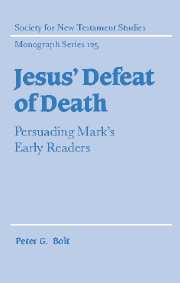Book contents
- Frontmatter
- Contents
- Preface
- Acknowledgements
- Note on the rendering of papyrological/inscriptional texts
- List of abbreviations
- 1 Introduction
- 2 The beginning of the Gospel (Mark 1.1–13)
- 3 The kingdom is near (Mark 1.14–4.34)
- 4 Jesus and the perishing (Mark 4.35–8.26)
- 5 Entering the coming kingdom (Mark 8.27–10.52)
- 6 The clash of kingdoms (Mark 11.1–13.37)
- 7 The coming of the kingdom (Mark 14–16)
- 8 Conclusions: Mark's impact on early readers
- Bibliography
- Index of biblical references
- Index of ancient sources
- Index of modern authors
- Subject index
6 - The clash of kingdoms (Mark 11.1–13.37)
Published online by Cambridge University Press: 22 September 2009
- Frontmatter
- Contents
- Preface
- Acknowledgements
- Note on the rendering of papyrological/inscriptional texts
- List of abbreviations
- 1 Introduction
- 2 The beginning of the Gospel (Mark 1.1–13)
- 3 The kingdom is near (Mark 1.14–4.34)
- 4 Jesus and the perishing (Mark 4.35–8.26)
- 5 Entering the coming kingdom (Mark 8.27–10.52)
- 6 The clash of kingdoms (Mark 11.1–13.37)
- 7 The coming of the kingdom (Mark 14–16)
- 8 Conclusions: Mark's impact on early readers
- Bibliography
- Index of biblical references
- Index of ancient sources
- Index of modern authors
- Subject index
Summary
The fourth main section presents the story's ‘rising action’, as events begin to head inevitably towards the promised death of the Son of Man which will be followed by the promised resurrection. The section begins with a clear temporal and geographical patterning which builds momentum towards the events in Jerusalem. It spans three days. The first two days establish the geographical pattern: a journey from Bethany to Jerusalem and back (Day 1: 11.1–11; Day 2: 11.12–19). On the third day, the same pattern commences: the morning journey to Jerusalem (11.20) ends in the temple (11.27). Although the journey home begins as they move away from the temple (13.1) across the Mount of Olives (13.3), its conclusion is never reported, even though it is assumed to have occurred (14.3). The journey home is delayed on the Mount of Olives while Jesus delivers his longest speech which functions as a narrative aside, i.e., it creates a pause in the movement in order to force reflection on the narrative. Because of the open-ended third day, the entire section (11.27–13.37) reads as a connected sequence, with the three days functioning together to bring the narrative to its crisis.
Day 1: the coming kingdom of David (11.1–11)
The first day is filled with expectation, but nothing happens. Jesus enters Jerusalem in a manner which appears to make a deliberate messianic claim. Whether or not the crowd realise what is going on, their words have great significance, sustaining the readers' expectation of the coming kingdom (vv.10f.).
- Type
- Chapter
- Information
- Jesus' Defeat of DeathPersuading Mark's Early Readers, pp. 244 - 253Publisher: Cambridge University PressPrint publication year: 2003



